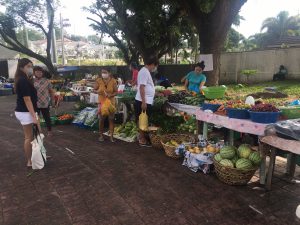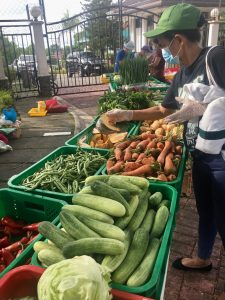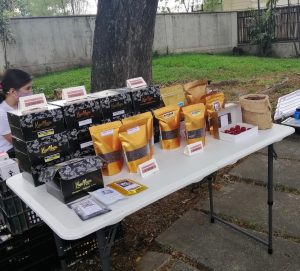One of the good things brought by the enhanced community quarantine (ECQ) is the resurgence of community markets.
For those of us cooped up in isolation while staying at home, being able to go out and interact with other people in person — even when two meters apart and while wearing face masks — is such a blessing.
In the Philippines, farmers’ markets that offer fresh, local, and organic produce as well as artisanal food products are often perceived as catering only to a privileged sector of the population with disposable income. Popular markets such as the Salcedo Market every Saturday and the Legazpi Market every Sunday in the heart of Makati City’s business district as well as the newer My Saturday Market in Bonifacio Global City (BGC) in Taguig are usually what comes to mind so naturally Filipinos would think farmers‘ markets are a luxury not everyone can afford.
While that may be true in Metro Manila, a highly urbanized area not really known for organic farms, that is certainly not the case with the country’s food basket, Davao City. In fact, some of the produce being sold in Makati and BGC farmers’ markets came all the way from Davao.
So when our village, Woodridge Park in Ma-a, announced that we will be having a community market every Wednesday and Saturday during ECQ, I got really excited.
Our community market is being organized by the Woodridge Park Homeowners’ Association, Inc. (WPHAI) and it is exclusive to homeowners and residents of the village. It started last April 29 and it is located at the parking lot under a canopy of trees outside of gate two, the gate facing C.P. Garcia Highway (more popularly known as Diversion Road) beside Saint Francis of Assisi Parish Church.
Our community market opens at 7:00 am and closes at 12:00 noon. To avoid crowding and to maintain social distance, marketing schedule is implemented based on the last digit of a homeowner’s market pass. Pre-numbered market pass cards were issued by the association, different from the food and medicine pass cards issued by the City Government of Davao.
Instead of rotating days, we have rotating hours. Residents are allowed to shop together at the same hour if they have the same last digit pass number. We are assigned different hours every market day. So if I have 7:00-8:00 am on Wednesday, I will have 8:00-9:00 am on Saturday, then 9:00-10:00 am on the next Wednesday and so on. The time schedule is rotated to spread the advantages and disadvantages of the different times.
To discourage lingering, residents are only given an hour to shop during their pre-assigned schedule in the small market of around 15 vendors that sell fruits, vegetables, meat and poultry, fish and seafood, and other essential household items. Residents who wish to sell food products are also encouraged to participate in the market.
Everyone must wear face masks and encouraged to bring alcohol and hand sanitizers to clean hands frequently. Shoppers also bring their own eco bags and baskets, even trolley carts. Some residents, like me, just walk to and from the market as a form of exercise while those who live farther from the market bring their bikes and cars and park them near the gate.
“We have received a lot of positive feedback from Woodridge Park residents and even non-residents for this initiative,” shared Engr. Ismael Tabije, one of the officers of WPHAI. “They noted how well-organized it is with social distancing properly observed and how reasonable market prices are,” he added.
Tabije said that personnel from the Department of Agriculture (DA) and Task Force Davao (TFD) visited the market and were satisfied that quarantine regulations and protocols are being followed.
With a captured market of over 500 households, vendors are “quite happy with the revenues” they are earning from the Woodridge Park market. They also appreciate that the homeowners‘ association did not collect rental fees or get commission from their sales.
Although only an average of 300 residents go to the market at a given market day, the sellers are surprised that their products easily run out as early as 9:00 am.
“On the first day, many of the vendors underestimated the demand so they brought more stocks in the succeeding market days,” Tabije said. As more homeowners heard about the community market, demand started to rise.
After operating for five days now, the Woodridge Park Community Market has developed its own unique rhythm. Residents are bonding. “Suki” relationships are being forged. Numbers are exchanged. More orders being placed. Market offerings are diversifying. There’s even a soundtrack to our shopping now courtesy of the music from the guardhouse (during my last market day, we were grooving to the musical, “Ang Huling El Bimbo’).
The original plan was to only have the community market until the ECQ is lifted. But now that residents seem to enjoy the convenience, the safety, and the sense of community the market brings, it is something WPHAI is seriously considering making a part of the Woodridge community life.
It is not just the human interaction, it is the joy of picking fresh produce and knowing where your food comes from.
“Markets are very reassuring places because they give you a sense of responsibility for your own health,” noted David O’Neil of the Project for Public Spaces (PPS), a nonprofit organization based in New York dedicated to helping people create and sustain public spaces that build strong communities.
In this time of unprecedented public health crisis, taking back control of our own health through our food choices is one crucial step in fighting any pandemic.
As Davao City plans to gradually transition to the “new normal,” promoting the establishment of community markets, especially in neighborhoods with insufficient access to healthy, fresh food is the best way to move forward.
It will not only lessen the risk of spreading infection in the city as it decongests our public markets and supermarkets, neighborhood markets can also become a vibrant, safe community gathering places, providing economic opportunities to local residents.
With cities being disconnected from the sources of the food they consume, community markets that allow food producers to sell directly to consumers will enable people to connect with food in a healthy, more sustainable way.
Davao City is blessed to have vast agricultural lands, mountains, and water resources that can nourish and sustain a healthy life for all its residents. The opportunities for rebuilding and strengthening our city while we recover from the coronavirus crisis are there. We have taken them for granted and the pandemic reminded us of what we already have.
Instead of building more shopping malls and tall condominium buildings, let us set up farmers markets in all neighborhoods and create more wide, open spaces with lots of trees and flowers where we can interact even while two meters apart.
That is how we become better. That is how we heal as one community.


